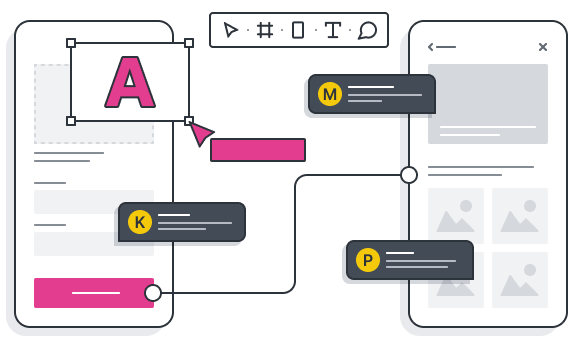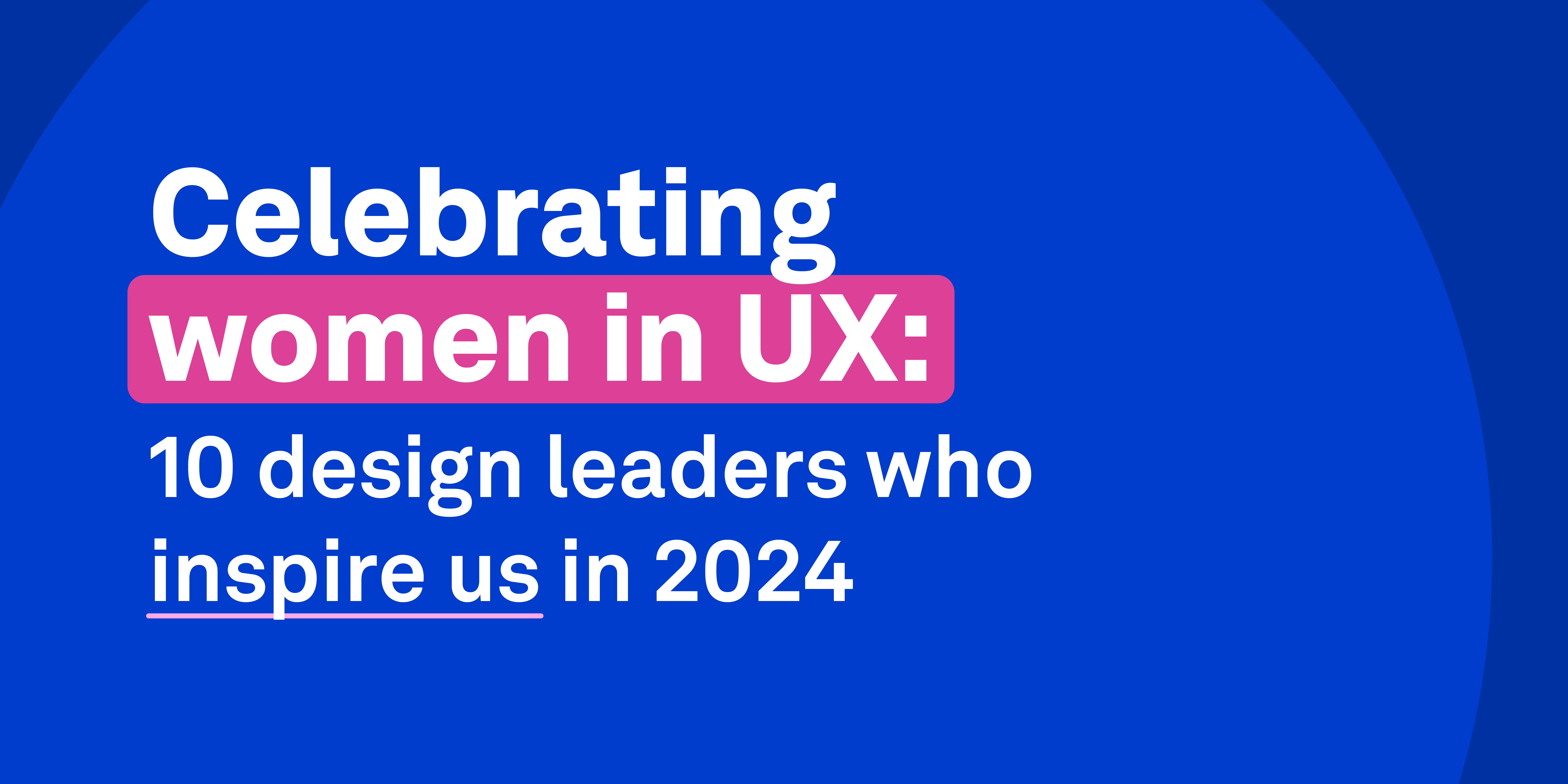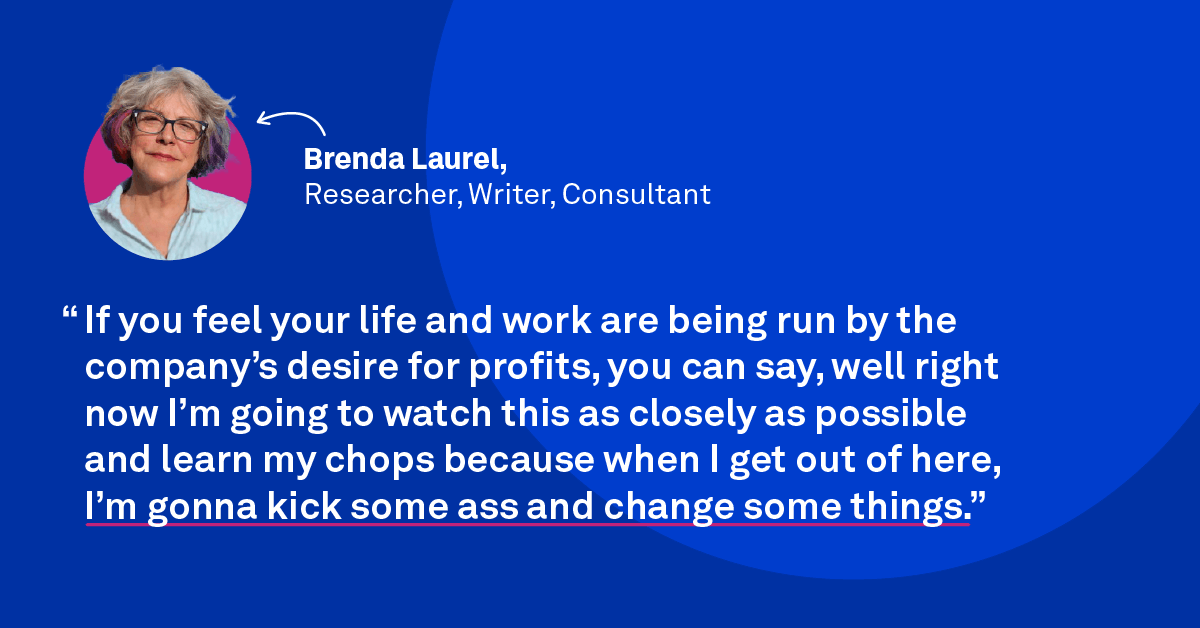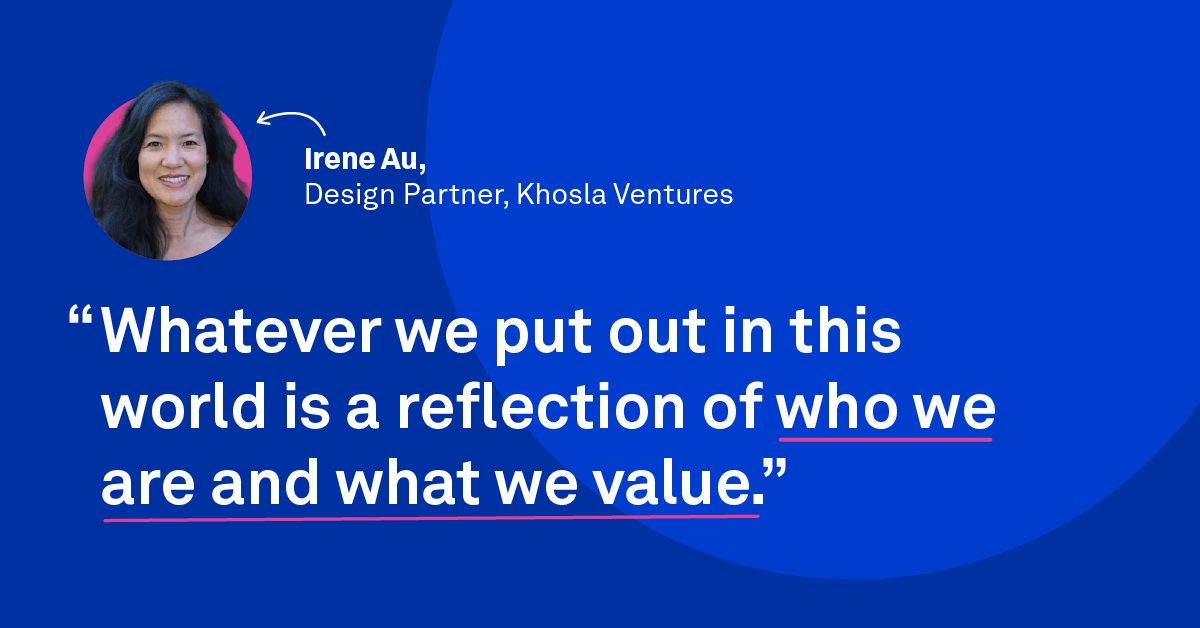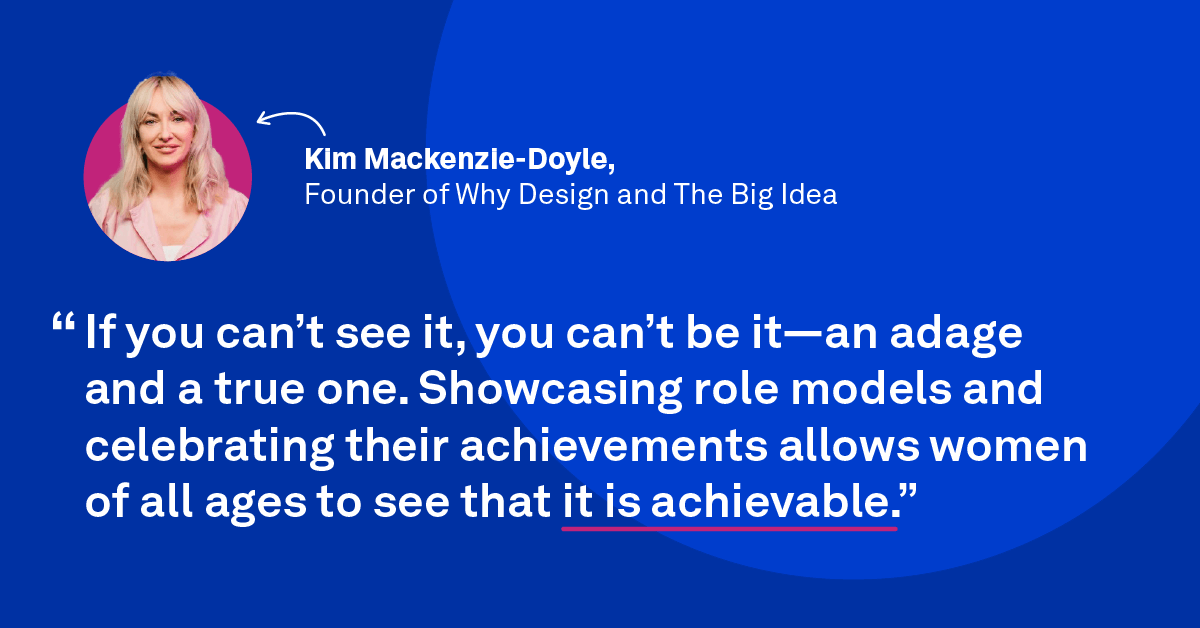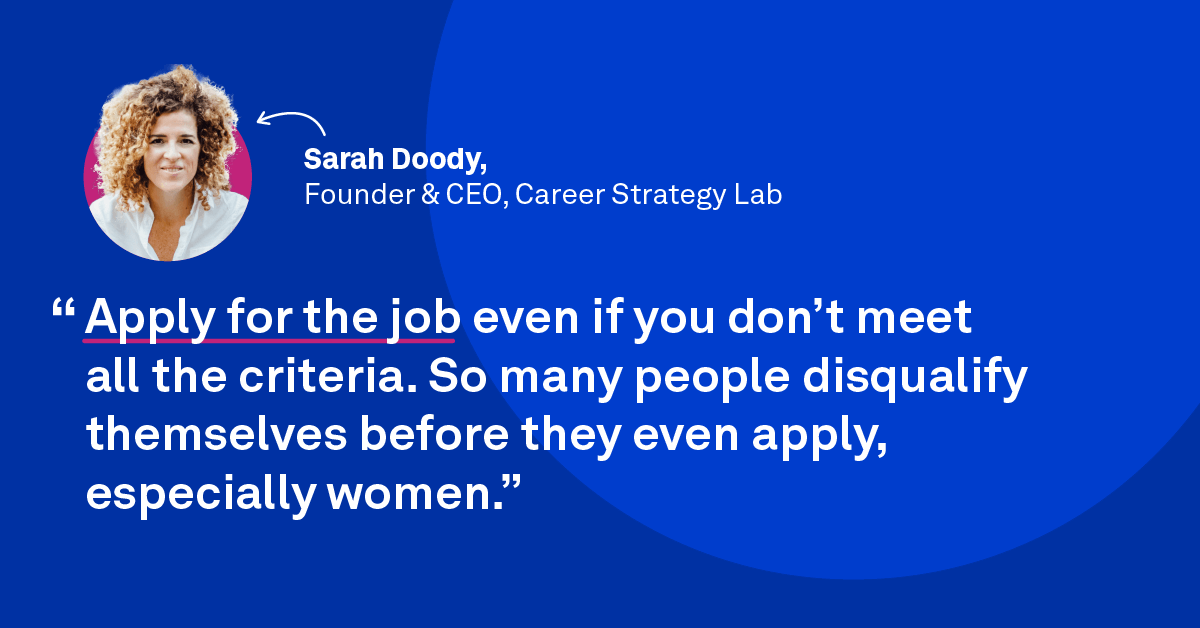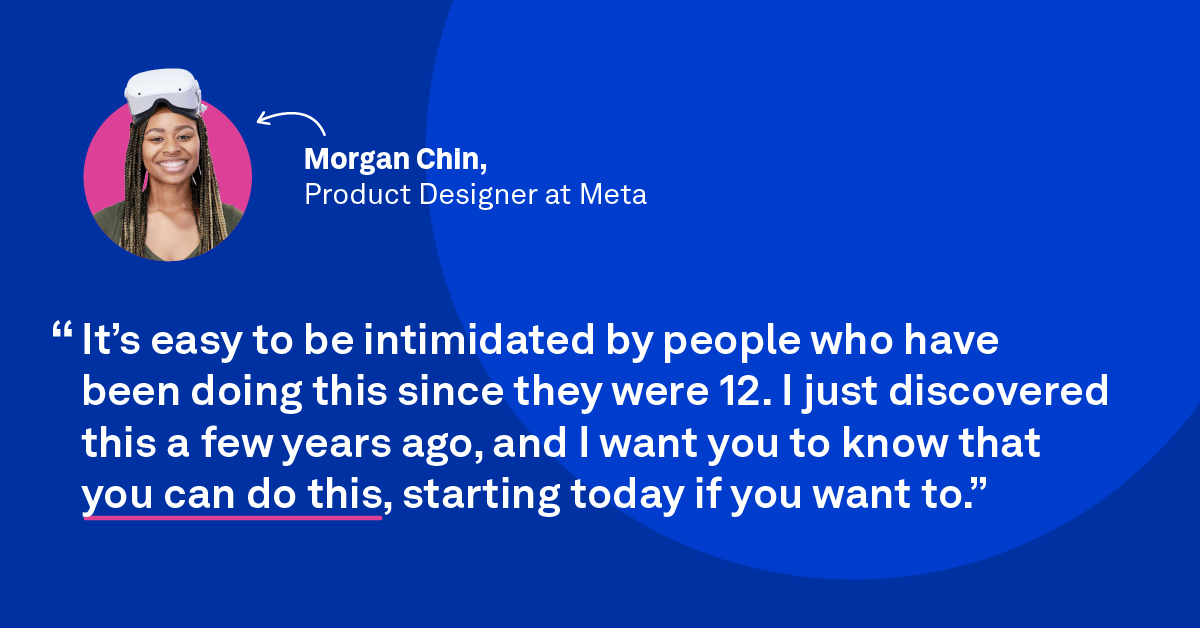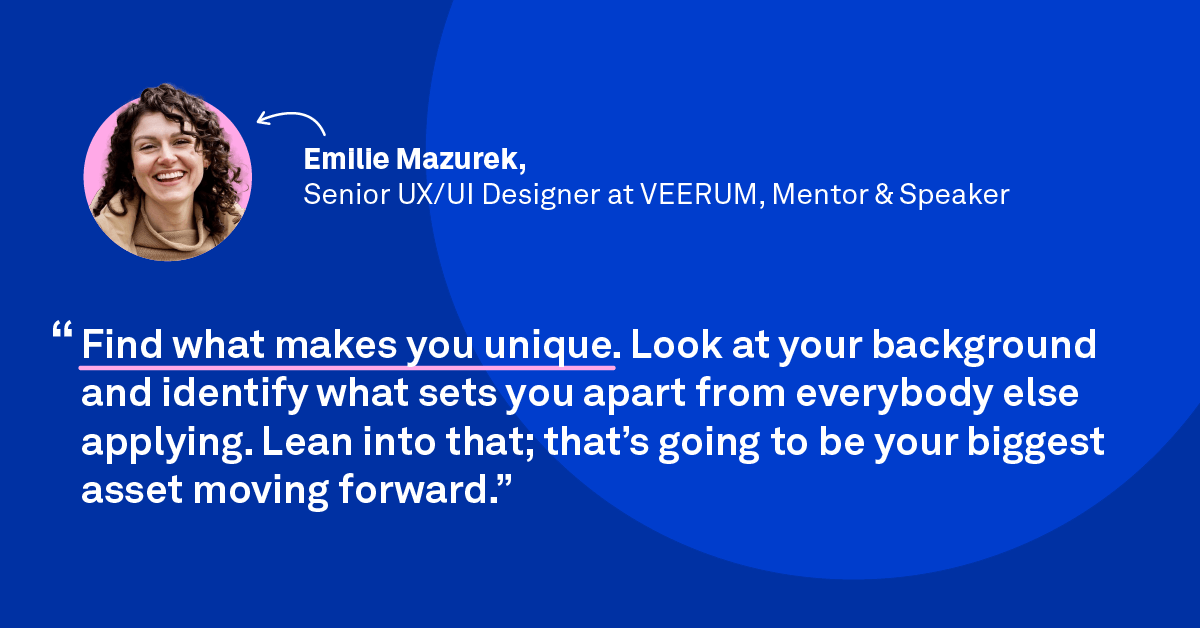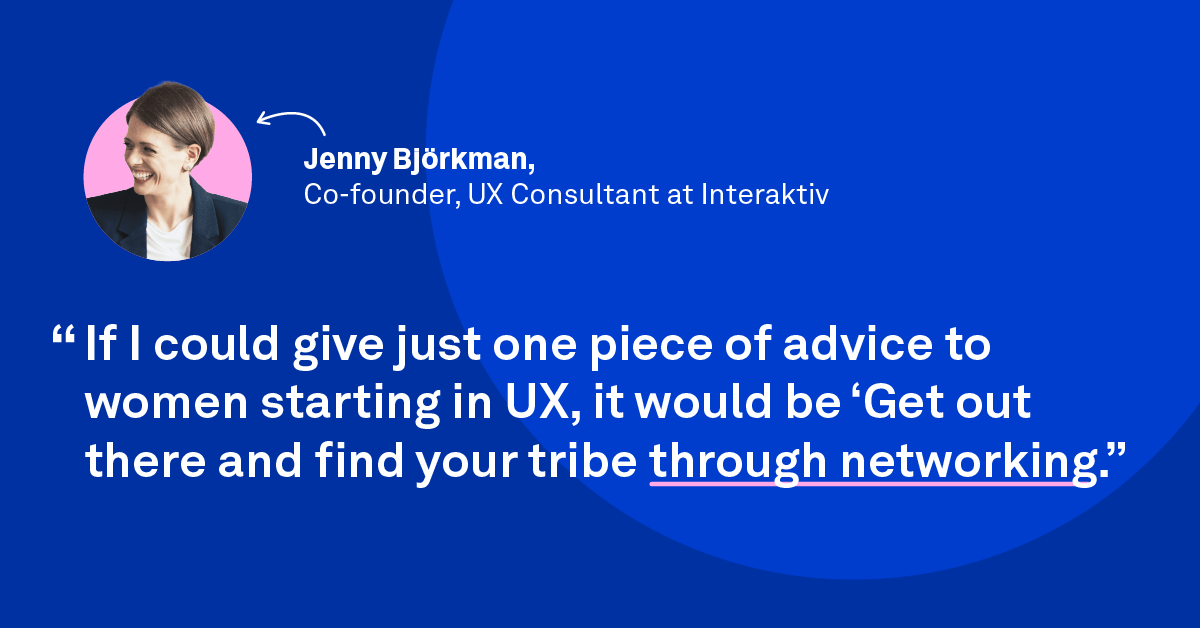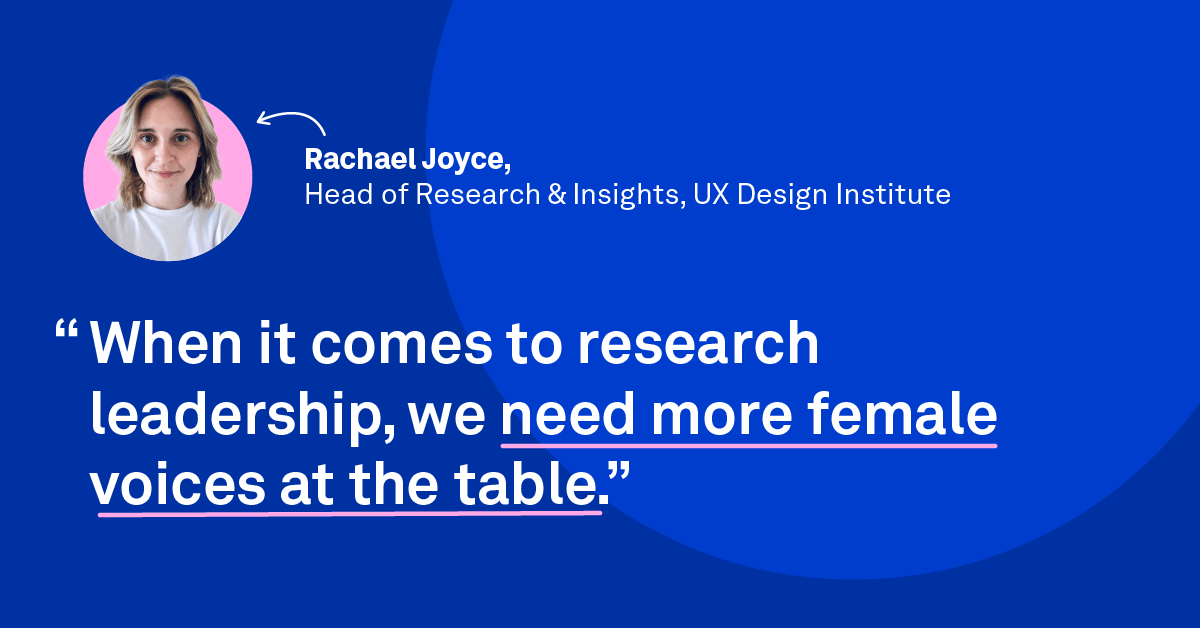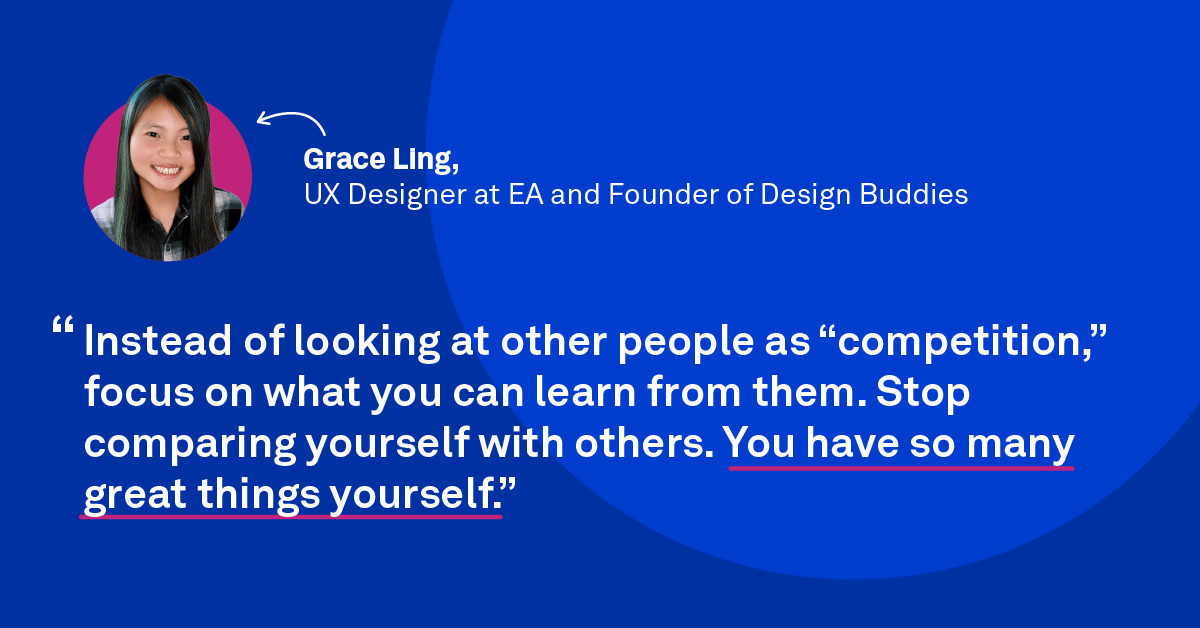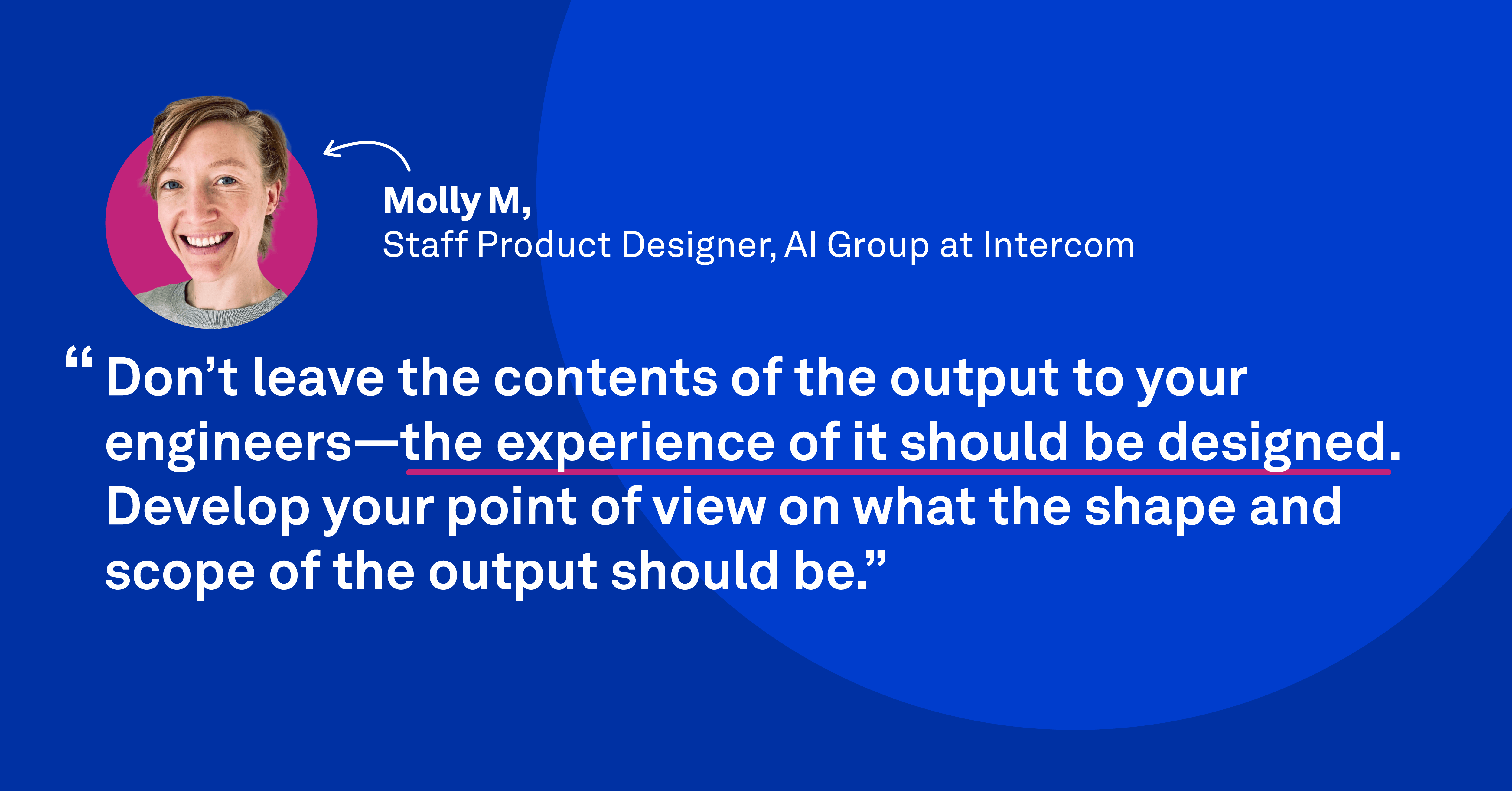Each year on the 8th of March, International Women’s Day celebrates the achievements and contributions of women all over the world.
This year, the official theme is Inspire Inclusion; a reminder that, when we inspire others to understand and value women’s inclusion, we forge a better world. And, when women themselves are inspired to be included, this creates a sense of belonging, relevance, and empowerment.
In the spirit of inspiring inclusion, we’re highlighting 10 phenomenal women in UX design. All of these women are shaping the industry in their own unique way. Collectively, they’re breaking barriers, challenging norms, and empowering the next generation of women designers.
Join us as we shine the spotlight on their invaluable contributions and celebrate their impact—on International Women’s Day and beyond.
Brenda Laurel
Brenda Laurel: a name synonymous with innovation, tenacity, and thought leadership.
Brenda is a pioneer in human-computer interaction and interactive media, best known for her work in the video game industry. She started her career at CyberVision, a small games company, in 1976, followed by posts at Atari, Activision, and Apple.
After two decades in this typically male-dominated field, Brenda set out to tackle the gender gap. She co-founded Purple Moon, a studio dedicated to creating video games for girls. In doing so, Brenda sought to combat gender stereotypes, encourage young girls’ interest in technology, and “help girls feel better about themselves and celebrate their diversity.”
Brenda is a firm proponent of designing for good—but she acknowledges that that was only really possible once she’d worked her way up in the industry and started her own company. In reality, many designers will struggle to reconcile their ethical aspirations with the work they’re being paid for. If that’s a situation you find yourself in, Brenda has some advice:
“If you’re trapped in a situation where you feel like your life and your design work are being run by the company’s desire for profits, one thing you can do is say, well right now I’m just going to watch this as closely as possible and learn my chops because when I get out of here, I’m gonna kick some ass and I’m going to change some things. That’s how I spent 15 years in the computer game industry before I created a computer game company for little girls that wasn’t Barbie.”
Besides being a game designer, entrepreneur, and all-round advocate for diversity and inclusion, Brenda has held academic positions at prestigious institutions like the California College of Arts and the Art Center College of Design.
She is also an esteemed author, with Computers as Theatre (1993), Utopian Dreams and Dystopian Realities in the Video Game World (2014), and Design for Everyone (2016) among her most influential titles. And, fortunately for us, she continues to share her expertise and candid words of wisdom on various panels and event stages around the world.
Brenda is an exceptional leader in the design industry. Her career is full of remarkable achievements—and, beyond that, it’s a testament to the importance of empowerment and forging your own path.
Irene Au
No list of UX leaders would be complete without Irene Au. Irene has been instrumental in shaping the industry as we know it—and she’s literally had a hand in designing the internet.
Irene started her career as an interaction designer at Netscape, the world’s first commercial web browser. Here, she says, it became immediately apparent that she wanted to focus her life’s work on making the internet as accessible as possible.
Irene spent the next 14 years of her career working at Yahoo! and Google respectively, where she built out their human-centred design practices and headed up their global UX efforts.
Irene is not just a designer by trade, though; she’s a designer by nature, driven by a desire to make the world a better place. She recalls how she discovered her passion for UX while studying electrical and computer engineering in the mid-90s:
“I found that my peers were all very interested in creating technology for the sake of technology—they were just in love with the technology without giving a lot of thought to what they were building and why it might be relevant. I was especially interested in studying how technology can serve people so that we elevate our own existence here in the world and make our own lives easier.”
This passion, it seems, has never waned. Throughout her career, Irene has been a vocal advocate for user-centred, empathy-driven design. And, in addition to being an incredibly talented practitioner, Irene is a driving force for diversity and inclusion within the industry.
Following her tenure at Yahoo! and Google, Irene’s desire to democratise higher education and create “more and better pathways into the tech industry” led her to Udacity, where she worked as the VP of Design for several years.
Irene believes that designers have a great opportunity—and indeed a responsibility—to make a positive difference in the world:
“Whatever we put out in this world is a reflection of who we are and what we value as important. Designers play an important role in helping the makers of technology to remember that we live in an ecosystem. It’s multivariate, there are many lives at stake, and we need to look at the whole ecosystem and how everything is interconnected in order to preserve a balance that’s optimised towards the wellbeing of all living things on this planet.”
Irene is a truly inspirational design leader. Her commitment to designing for a better world and uplifting others has had a profound impact on the industry—and will no doubt continue to do so.
Kim Mackenzie-Doyle
Kim Mackenzie-Doyle is a product design powerhouse and tireless entrepreneur. She studied Industrial and Product Design at the Institute of Technology, Carlow, in Ireland, and has been making waves in the industry ever since.
Kim has held many pivotal roles throughout her career, including that of Industry Design Specialist at her alma mater, Design Lecturer at Maynooth University, Chief Design Officer at Hub Controls Ltd, and President of the Institute of Designers Ireland, where she currently serves as a board member.
An impressive resumé indeed—but it doesn’t stop there. Kim’s talent and dedication have won her numerous prestigious awards, including the Creative Industries Leader of the Year Award in 2019 and the IDI Best Product Design Award in 2017.
Kim is at the very top of her game, but she doesn’t want to be there alone. Throughout her career, Kim has worked tirelessly to pave the way for more women in UX.
In 2017, she founded WhyDesign—a platform dedicated to showcasing influential women designers in Ireland. WhyDesign is both a celebration of women in the field and a call for greater diversity and inclusion within the design community.
Speaking on WhyDesign’s mission, Kim says:
“If you can’t see it, you can’t be it—an old adage and a true one. Showcasing role models and celebrating their achievements allows women of all ages to see that it is achievable.”
In 2019, Kim launched another venture: The Big Idea. This groundbreaking initiative seeks to nurture creative thinking skills among Transition Year students in Ireland, with a focus on inclusivity and innovation.
“For years, I’ve been frustrated with how creativity is valued in Ireland. We have massive social issues facing us and the generation coming up, yet we’re not teaching the skills they need to tackle these issues. Employers are looking for creative thinkers, but you are just expected to be creative. It’s approached like a talent, but creativity is a skill that can be taught and The B!g iDea grew out of that. I wanted to find a way to teach creativity in our schools, and I wanted to deliver it free, to make it as inclusive as possible. I also wanted a course to suit all learning abilities and styles.”
For Kim, design is not just about creating beautiful products. It’s about driving social impact and addressing critical issues like gender equality, diversity, and climate change. Kim is an inspiration to designers everywhere—and exactly the kind of role model we need in the industry.
Sarah Doody
If you’re active on social media, you’re likely already following Sarah Doody. Sarah is a top voice in UX with over 70,000 followers on LinkedIn alone.
Sarah is known for her work as a UX designer, researcher, and passionate educator. She spent the early years of her career on the New York City startup scene before embarking on a highly successful journey as a self-employed designer and strategist. Sarah has had a hand in shaping the UX for major brands such as CitiBike, WeWork, The Muse, Dow Jones, and many, many more.
Sarah’s remarkable career as a UX practitioner has gradually evolved to focus on education and mentorship. In 2017, she founded Career Strategy Lab—a UX career coaching incubator aimed at helping professionals in the field advance their careers.
Sarah is also currently working on her new book, The Product of You: How To Design, Market, And Sell Yourself In Your Career. The book will help creative and tech professionals apply their problem-solving skills to their own careers, and is due for release in 2024. Watch this space!
On the issue of getting more women into UX, Sarah talks about the importance of representation:
“As the UX community grows, we must work hard to increase awareness of other women in UX. Once I said to someone, “Why should I teach UX, aren’t there enough UX courses out there?”, and the person replied, “Yes, but some people want to learn from you.” We’re drawn to and connect with different types of people—personality, background, life experience. By promoting a diverse range of women in UX, we increase the awareness of many great people to learn from.”
And, if you’re already working in the field, Sarah urges you to back yourself when it comes to taking the next step in your career.
“Apply for the job even if you don’t meet all the criteria. So many people disqualify themselves before they even apply, especially women. By not applying, you’ll 100% not get an interview. Your job search is not the time to be bashful. So take a chance on yourself and apply.”
Through her teaching and coaching, Sarah has empowered others to pursue a career in UX design and make meaningful contributions to the industry. Her work continues to ensure that UX becomes the diverse space we need it to be.
Watch: Finding UX roles outside of the tech industry with Sarah Doody.
Morgan Chin
Five years ago, Morgan Chin was an elementary school teacher. Now, she’s a product designer at Meta, taking the VR industry by storm.
That’s quite a career change—and a testament to Morgan’s ambition, curiosity, and relentless drive to learn new things. To set the wheels in motion, Morgan completed a master’s degree in Human-Computer Interaction at Georgia Tech. While studying, she took an internship at Meta (“NEVER thinking they would respond to me when I applied!”).
This marked the first time that Morgan had worn a VR headset, and she was completely hooked from that moment on. Now, she’s once again working at Meta; this time as a full-time product designer for virtual reality (VR).
Both in and outside of her role, Morgan is passionate about increasing diversity in the field and creating experiences that are accessible for all. She takes her responsibility as a designer seriously, and her desire for a more inclusive world underscores her day-to-day work:
“VR still has a long way to go in terms of being accessible for everybody. When developing products, we try to think about the risks and impact a product might have on different groups of people, and if it’s actually inclusive of different people. Are we leaving anyone out? Are we testing it with different types of users? Are we representing everybody when we create avatars?”
Morgan’s fledgling career has already been a remarkable success. However, she speaks candidly about the realities of imposter syndrome—and urges others not to let their newcomer status hold them back.
“It took some months for me to be like, “Ok, you’re doing a good job, you got this, you’re killing it!” It did take some time and a lot of reassurance to know that I belong here—and I want you all to know you belong here. It’s easy to be intimidated by people who have been doing this since they were 12; people love to say “I’ve been drawing my whole life!” or “I’ve been coding since I was 12.” Well, I haven’t. I just discovered this a few years ago, and I want you to know that you can do this, starting today if you want to. You do belong here, and don’t let anyone make you feel like you don’t.”
While building her own incredible career, Morgan is continuously empowering others to make their mark on the industry. She documents her career journey on social media and shares invaluable tips and advice for breaking into tech. Follow her now!
Watch: The UX of VR (Virtual Reality) with Meta’s Morgan Chin.
Emilie Mazurek
Many of the best UX designers come from unconventional backgrounds, and Emilie Mazurek is one of them.
Emilie studied biochemistry at university and was on track to become a medical doctor. However, the further she got down that path, the less certain she became. During a session with a careers counsellor, she discovered UX—a turning point she describes as a light-bulb moment.
Wasting no time, Emilie completed her UX diploma, landed her first design role at Proposify, and was promoted to senior product designer shortly after.
Emilie’s story highlights the value of transferable skills for a career in UX. She identified her unique strengths and used them to her advantage—and she strongly urges aspiring designers to do the same.
“Find what makes you unique. Look at your background and identify what sets you apart from everybody else applying. Lean into that; that’s going to be your biggest asset moving forward. My background is in science, and I was in school with all these graphic designers. The work they were producing was phenomenal. I was like, how am I going to compete with all these people? But I was looking at it from the wrong angle. When I got hired for my first position, I was chosen over somebody else who had five years’ experience in UX, because of my background as a scientist. They wanted somebody who would be comfortable running experiments and had an analytical mindset.”
Emilie is passionate about breaking down barriers and helping others launch their own UX careers. When she’s not working, you can find her mentoring junior designers, passing on pearls of wisdom through panels and public speaking engagements, or sharing her expertise across various industry publications.
Watch: Unlocking your UX career with Emilie Mazurek and UX Design Institute.
Jenny Björkman
Jenny Björkman is a founder, UX consultant, active mentor, facilitator, guest speaker and panel member for various design and tech organisations.
With a profile like that, you might think Jenny has spent her entire career in the industry. But actually, she transitioned into UX much later on—a testament to the fact that it’s never too late to break into the field.
Jenny was working in project management and marketing when she discovered UX; a discipline she instantly fell in love with and had to pursue. She obtained her UX diploma from the UX Design Institute and has been unstoppable ever since.
After working as UX Lead at a fintech company for three years, Jenny co-founded Interaktiv Studio, a boutique design consultancy dedicated to app and website design.
Not only is Jenny a successful entrepreneur and UX leader; she is also an active advocate of tech for social good. At Interaktiv Studio, Jenny donates a portion of her time each month to help charities and not-for-profit organisations.
She is also committed to helping others break into the UX industry. Jenny is a passionate career coach and mentor, working with organisations such as Mega Mentor, Women in Banking and Finance UK, and the UX Design Institute to coach and empower her fellow designers.
For women starting out in UX, Jenny has some sound advice:
“Get out there and find your tribe through networking. Have a look at UX meet-ups in your area. You’ll be surprised by how many are out there, both face-to-face and online. You’ll meet like-minded UXers, learn about the latest developments in the industry, and hear about more career opportunities.”
Jenny entered the UX industry from a seemingly unrelated field and has well and truly taken it by storm. She’s an inspiration to us all—and reminds us just how much the UX industry benefits from diverse perspectives, brought from all different educational and professional backgrounds.
Read: From project manager to UX designer: Jenny Björkman’s career-change story.
Rachael Joyce
You can’t have great UX without great user research—and you can’t have great user research without people like Rachael Joyce.
With her background in psychology and over a decade of industry experience, Rachael has carved a successful career in UX research, leveraging her expert understanding of human behaviour to bridge the gap between users and businesses.
In her role as Head of Research & Insights at the UX Design Institute, Rachael is not only shaping the critical field of UX education. She also serves as a powerful example of women in UX leadership.
Speaking on the importance of representation and diverse perspectives within UX research, Rachael explains:
“Working in user research is a hugely rewarding career. Your work is dedicated to unearthing user problems and finding solutions to them, so you do feel like you are making a difference in people’s lives. Inclusivity is essential when we conduct research, so we can understand what different kinds of users need, and how we can make our products and services more appealing and accessible to them. This kind of inclusivity is also essential when it comes to research professionals. The UX research industry needs the best minds from diverse backgrounds, and women have important perspectives and insights to bring. Particularly when it comes to research leadership, we need more female voices at the table.”
When she’s not uncovering valuable insights, solving user problems and driving innovation, you may be lucky enough to catch Rachael sharing her advice and expertise in webinars and panel discussions. If you’re aspiring to work in UX research, you only need to look at Rachael to see what’s possible.
Grace Ling
Grace Ling is a product designer at Electronic Arts (EA), a video game company headquartered in Redwood City, California. She is also a founder, illustrator, content creator, and passionate community builder.
With a background in computer science and engineering, Grace has carved out an incredibly varied career path spanning research, design, virtual reality, and events (to name just a few).
Grace is making her mark on the UX industry—and she’s empowering others to follow in her footsteps. In 2020, she founded Design Buddies, a community dedicated to helping UX designers land jobs, improve their skills, and make friends. With over 150,000 members to date, Design Buddies is the world’s largest community of its kind.
And Design Buddies isn’t the only place to benefit from Grace’s expert insights. She also has a podcast and a newsletter, and regularly speaks at live events. You can find a selection of Grace’s best interviews and keynotes here.
Grace’s passion for UX is infectious, and her dedication to uplifting others in the field is commendable. Speaking on the importance of community, collaboration, and courage, Grace shares advise on her LinkedIn feed:
“Instead of looking at other people as “competition,” focus on what you can learn from them. Maybe even collaborate and create something cool together. Stop comparing yourself with others. You have so many great things yourself. Try new things. Don’t wait for anyone’s “permission” to do so. It’s fun and will help you build more skills! It’s your life, not someone else’s. Own it.”
Grace is a true leader in the industry. And, thanks to her openness and willingness to share her journey, we can all learn and take inspiration from her.
Watch: Getting hired in UX—Personal branding, content creation, and networking 101 with Grace Ling.
Molly Mahar
In the age of AI, UX designers increasingly find themselves navigating new frontiers. Leading the charge in this exciting domain is Molly Mahar, a seasoned product designer and AI and machine learning expert.
Molly has been designing AI and enterprise products since 2016 and currently works as a product designer within the AI Group at Intercom. She has played a pivotal role in designing Intercom’s AI chatbot, Fin—a groundbreaking project that speaks to Molly’s ability to solve complex problems and craft intuitive user experiences with AI technology.
Beyond excelling in her career, Molly is passionate about passing on her knowledge and expertise. She regularly shares actionable advice and insights into her design process through articles and interviews, both guiding and empowering others to navigate the complexities of designing for AI.
And, when it comes to creating AI-based products, Molly emphasises the critical role that designers have to play:
“Don’t leave the contents of the output to your engineers—the experience of it should be designed. If you’re working on an LLM-based product, this means you should experiment with prompt engineering and develop your point of view on what the shape and scope of the output should be.”
With her commitment to great UX and fearless approach to innovation, Molly is a trailblazer in the industry—and a true role model for the next generation of UX designers.
Read: A new age of UX: Evolving your design approach for AI products by Molly Mahar.
Looking beyond International Women’s Day to a more diverse and inclusive future
As we reflect on the remarkable achievements of these UX leaders, one thing is for certain: the industry would not be where it is today without each and every one of them—and the countless other women who are working in UX right now or aspiring to do so in the future.
We hope their stories have inspired you to harness your own potential, embrace new challenges, and drive positive change in this exciting industry. And remember: while International Women’s Day is just once a year, we must continue to amplify, uplift, and empower women in the industry every single day.
Are you feeling inspired to start your own career in UX? Check out the UX Design Institute’s Professional Diploma in UX Design. You’ll learn flexibly online with a university credit-rated curriculum written and vetted by industry practitioners. And, while the course is flexible, you won’t be going it alone. You’ll have the support of expert mentors, a community of fellow UX students, and one-to-one career coaches every step of the way.
